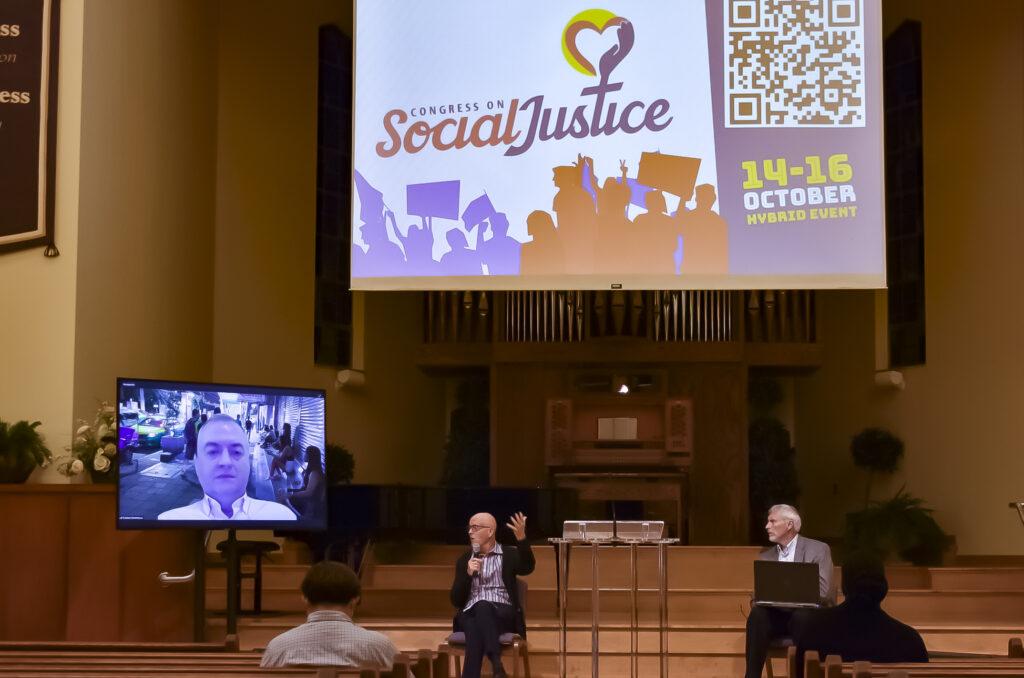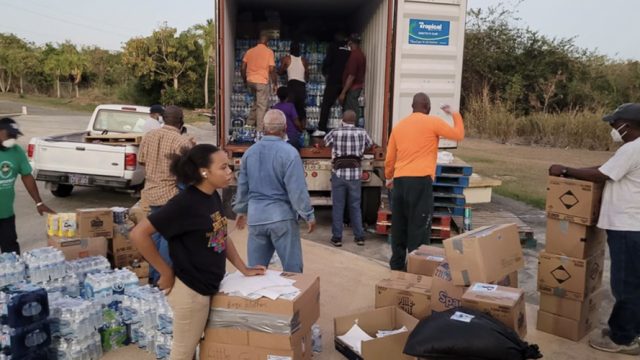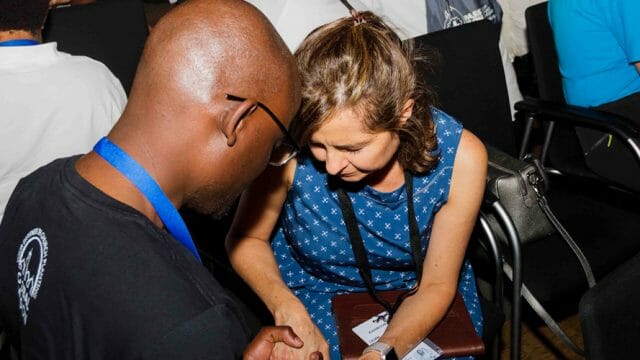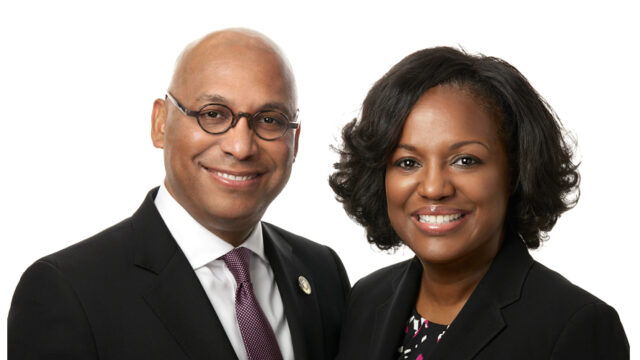Researcher discusses individual, collective involvement to fight a worldwide scourge.

“Social justice means not being afraid of red-light districts,” Cristian Dumitrescu said in his keynote address on the opening night of the Congress on Social Justice at Andrews University in Berrien Springs, Michigan, United States, October 14. “We need to meet people where they are.”
In his online presentation, Dumitrescu, a professor of world mission and intercultural studies and researcher at the Adventist International Institute of Advanced Studies (AIIAS) in the Philippines, discussed the global scourge of sex trafficking and what Adventist leaders, pastors, and church members can do to assist those involved.
Statistics are staggering. Take forced marriages, for instance. In 2016, Dumitrescu noted, 13 million women were forced into getting married at a young age. More than one-third are children under 15, and many are as young as nine, he reported.
Exploitation adopts many forms, something that underpins the complexity of sex trafficking, Dumitrescu said. People who somehow have fallen into sexual exploitation against their will are very vulnerable. They feel used, rejected, and judged by others, he explained. Even Christians often feel repulsed by them. “Their situation is desperate because they have no voice,” he said. While the Bible doesn’t address the issue directly, Dumitrescu added, Christians are called to address social injustice, including sexual exploitation.
Our greatest example of how to treat the outcasts in our society, Dumitrescu reminded participants, is Jesus. “His disciples felt uncomfortable in the presence of women and followed prejudice,” he said, noting also that Jesus was in the business of restoration. He restored, among others, the adulterer woman, the Samaritan woman, and the Syro-Phoenician woman, Dumitrescu reminded his listeners. We should strive to do the same, he emphasized.
The early Christian church also practiced justice through mercy and care for the needy. “God calls us as Christians to practice social justice by caring for the poor and the oppressed,” Dumitrescu said. It is something, he suggested, that includes sexual exploitation.
Dumitrescu emphasized that this task goes well beyond preaching a message of restoration. To show compassion to people who suffer, we must spend time with them. “Social justice is action,” he said. “Let’s act.”
After Dumitrescu’s presentation, participants had ample time to exchange comments and questions with him and with David Sedlacek, professor of family ministry and discipleship at Andrews University. Dumitrescu and Sedlacek discussed what church members, pastors, and leaders can do to follow in Jesus’ footsteps regarding this complex but potentially life-changing topic.
Just preaching the gospel?
Several participants asked panelists how to answer to a well-meaning church member or leader who emphasizes that all we need to do is “preach the gospel.” “Why does there seem to be a lack of connection between Bible beliefs and real life? Why is apathy so widespread?” some wondered. Sedlacek explained that sometimes, Christians believe they are relieved of their duty in this area because “it is the government’s job.” It happens to all of us. “When we are satisfied, we feel good and do not pay attention to what is around us,” Sedlacek said. “And often, we live disconnected from those realities.”
Another element that sometimes interferes with our response is what Sedlacek called “our eschatological mindset.” He explained, “We are looking forward to heaven, so we are disconnected from the realities of the earth.” But it shouldn’t be so, he emphasized. “When I look at Jesus, [I see] He was not disconnected from the realities of His world, and we also need to be widely connected and care about all the problems that are going on in the world today.”

Dumitrescu agreed, noting that wishing for fast evangelistic results is sometimes our worst enemy. “We need to change our mentality,” he said. “We must work with these people. Sometimes, we may not baptize anyone, but the service we will provide will change their lives for good.”
He also suggested that seminary students and pastors would do well in taking a break from preaching to spend some time in the streets. “The reality of this earth will shock you,” he said. He shared how he has taken his students to minister in the streets. After the eye-opening experience, “all of them said the same thing,” Dumitrescu shared. “They said, ‘We just now became aware of the realities we hadn’t been paying attention to.’ ”
Training leaders, including church pastors, is also crucial, panelists agreed. They should become aware of the issues and become ready to respond as needed and advisable.
What Church Members Can Do
“What can I do as a person, as a congregation, and as the denomination?” a participant asked. According to Dumitrescu, as a person or local church, it is essential to learn first to find out what works and what doesn’t. “Look around; open your eyes and ears,” he advised. This includes building bridges with people or organizations already working in that area.
Colette Newer, Adventist Community Services associate director at the North American Division (NAD) of the Seventh-day Adventist Church, agreed. “We need partnerships to work together with people who are already there. When we are acting in isolation it is very easy to get skewed,” she said.
Sedlacek said that even though they are not many, some Adventist congregations have made it their ministry to fight against social scourges, including sex trafficking. “This is the kind of ministry I would like to see,” he said. “More of that kind of practical, on-the-ground ministry.”
As a denomination, Dumitrescu said, he is not aware of any Adventist ministry or department that is presently trying to coordinate individual organizations or people to fight sex trafficking. It is clear, participants agreed, that there is an opportunity for growth in this area.
According to Sedlacek, we can start by educating ourselves and the next generation on how to protect themselves. “Sometimes, young ladies get mad at their families and run away,” he explained. “They become easy targets [for sex trafficking].”
He added that the church can also speak up against safe places for prostitution — those cities or states where prostitution is legal — that usually spur an increase in sex traffic.
Adventists can also contact organizations such as Adventist Development and Relief Agency (ADRA) regional offices, panelists advised. They are usually a better choice for finding a safe place for victims of sex trafficking or domestic violence. Going to the police does not always help, since corruption and connivance among authorities means that some pimps are protected.
Righteously angry
Sedlacek emphasized that we need to be righteously angry. “If we are not, we are not going to do anything about it. We need to be angry, just like Jesus was angry in the face of injustice.”
Dumitrescu agreed. “We need to pray that our eyes will be open,” he said. “Sometimes we see people in the street, and we do not realize they may be victims or perpetrators.”
Sedlacek added that our prayers should ascend to heaven on behalf of both the victims and the perpetrators. Even more, he emphasized, this is a systemic problem. “We should pray that the whole system is crushed,” he said. “It is a whole system that has to be dismantled by the Holy Spirit.”








